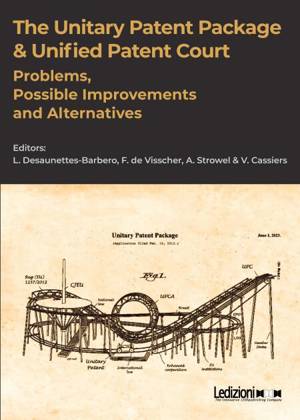
- Afhalen na 1 uur in een winkel met voorraad
- Gratis thuislevering in België vanaf € 30
- Ruim aanbod met 7 miljoen producten
- Afhalen na 1 uur in een winkel met voorraad
- Gratis thuislevering in België vanaf € 30
- Ruim aanbod met 7 miljoen producten
Zoeken
The Unitary Patent Package & Unified Patent Court E-BOOK
Problems, Possible Improvements and Alternatives
Luc Desaunettes-Barbero, Fernand de Visscher, Alain Strowel, Vincent Cassiers
E-book | Engels
€ 28,99
+ 28 punten
Omschrijving
As of 1st of June 2023, after years of negotiations, setbacks and postponements, the Unitary Patent Package (UPP) enters into force: the European patent with unitary effect (EPUE) becomes a reality and the Unified Patent Court (UPC) starts its activities.
Regrettably, the patent regime put in place is not a genuine EU system. Adopted through an enhanced cooperation procedure, it firstly does not include all EU Member States. Secondly, the conditions and the procedure for granting EPUE is in the hands of the European Patent Office, an international organization to which EU is not a party. Lastly, the substantive provisions and the litigation proceedings are defined by an international treaty (the UPC Agreement) to which EU is not a member, and by national laws for the remaining aspects. Such system carves patent law out of the EU legal and judicial orders and reduces the roles of the EU Parliament and Court of Justice. Challenges are numerous in terms of complexity, harmonization objectives, legality, business advantages and wider societal, economic and legal concerns, to name a few.
With twenty-eight contributions from academics and practitioners, this book starts with putting the new system into historical, comparative and institutional contexts (Part I) before highlighting some issues under EU law and the perspective of EU integration (Part II). The institutional, jurisdictional and procedural questions raised by the UPC are then addressed (Part III), as well as the innovation and markets issues (Part IV). The last contributions discuss possible improvements and alternatives to the Unitary Patent Package (Part V).
Regrettably, the patent regime put in place is not a genuine EU system. Adopted through an enhanced cooperation procedure, it firstly does not include all EU Member States. Secondly, the conditions and the procedure for granting EPUE is in the hands of the European Patent Office, an international organization to which EU is not a party. Lastly, the substantive provisions and the litigation proceedings are defined by an international treaty (the UPC Agreement) to which EU is not a member, and by national laws for the remaining aspects. Such system carves patent law out of the EU legal and judicial orders and reduces the roles of the EU Parliament and Court of Justice. Challenges are numerous in terms of complexity, harmonization objectives, legality, business advantages and wider societal, economic and legal concerns, to name a few.
With twenty-eight contributions from academics and practitioners, this book starts with putting the new system into historical, comparative and institutional contexts (Part I) before highlighting some issues under EU law and the perspective of EU integration (Part II). The institutional, jurisdictional and procedural questions raised by the UPC are then addressed (Part III), as well as the innovation and markets issues (Part IV). The last contributions discuss possible improvements and alternatives to the Unitary Patent Package (Part V).
Specificaties
Betrokkenen
- Auteur(s):
- Uitgeverij:
Inhoud
- Aantal bladzijden:
- 640
- Taal:
- Engels
Eigenschappen
- Productcode (EAN):
- 9788855269353
- Verschijningsdatum:
- 8/06/2023
- Uitvoering:
- E-book
- Beveiligd met:
- Digital watermarking
- Formaat:
- ePub

Alleen bij Standaard Boekhandel
+ 28 punten op je klantenkaart van Standaard Boekhandel
Beoordelingen
We publiceren alleen reviews die voldoen aan de voorwaarden voor reviews. Bekijk onze voorwaarden voor reviews.











